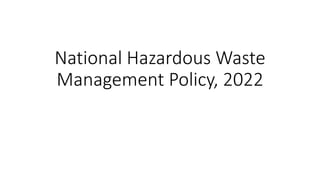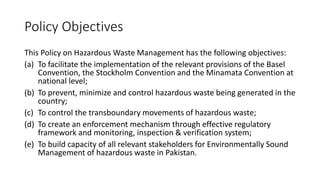National Hazardous Waste Management Policy, 2022.pptx
- 1. National Hazardous Waste Management Policy, 2022
- 2. Rationale of policy • (a) Pakistan is a party to the Basel Convention on the Control of Transboundary Movements of Hazardous Wastes and their Disposal, the Stockholm Convention on Persistent Organic Pollutants (POPs) and the Minamata Convention on Mercury. Being a responsible state Pakistan must formulate the NHWM Policy to incorporate the relevant provisions of these Conventions to fulfill its international obligations. • (b) GSP remains an effective Foreign Policy tool for the European Union (EU), and thus the EU is a proponent of its continuation post 2023. Compliance with the above international Conventions is also required by the EU for availing the next phase of GSP Plus status post 2023. Therefore, the formulation and implementation of NHWM Policy is crucial at this stage to take advantage of this opportunity beyond 2023 which will strengthen the economy of Pakistan by maintaining and even increasing its exports volume to the EU countries. • (c) Pakistan is facing an alarming issue of dumping of waste from developed and some developing countries. Absence of a clear policy direction and weak enforcement of other legislation on ban of import of HW has escalated this issue in Pakistan. • (d) Pakistan being an agricultural country is also making progress in industrial sector. Resultantly, chances of pollution of HW due to poor management have increased. Environment and public health are in danger. To protect the public health and environment is the sole responsibility of the Government of Pakistan. Therefore, pragmatic steps are needed to manage the menace of HW. • (e) Cost and benefit analysis and practices in developed countries have revealed that the management of HW at source is more cheap and easy practice than to clean the environment from hazardous waste. Therefore, it is high time to take action for 4 preventing, controlling and environmentally sound disposal of hazardous waste before investing on its cleanup. • (f) Poorer section of the society has more and direct dependency on the natural environmental resources. The pollution of the natural resources due to hazardous waste contamination affect the quality of these environmental resources and in turn, adversely affect the health and living conditions of people in general and poorer section or disadvantageous group of the society in- particular.
- 3. Policy Goal • The Environmentally Sound Management of Hazardous Waste in Pakistan, in keeping with the provisions of the relevant MEAs, to safeguard public health and the environment.
- 4. Policy Objectives This Policy on Hazardous Waste Management has the following objectives: (a) To facilitate the implementation of the relevant provisions of the Basel Convention, the Stockholm Convention and the Minamata Convention at national level; (b) To prevent, minimize and control hazardous waste being generated in the country; (c) To control the transboundary movements of hazardous waste; (d) To create an enforcement mechanism through effective regulatory framework and monitoring, inspection & verification system; (e) To build capacity of all relevant stakeholders for Environmentally Sound Management of hazardous waste in Pakistan.
- 5. Guiding Principles of policy • (a) The Source Reduction Principle- generation of waste shall be minimized in terms of its quantity and its potential to cause pollution in conformity with Article 4, paragraph 2 (a) of the Basel Convention; • (b) The Proximity Principle – ensuring the availability of adequate disposal facilities as close to the place of production as possible; • (c) The Precautionary Principle – considering the costs and benefits preventive measures shall be taken to control those releases to the environment of substances, waste or energy which are likely to cause harm to human health or the environment; • (d) The Standardization Principle - which requires the provision of standards for the ESM of hazardous waste at all stages of their processing, treatment, recovery, and disposal; • (e) The Least Transboundary Movement Principle – Transboundary movements of hazardous waste shall be reduced to a minimum consistent with efficient and ESM of hazardous waste in conformity with Article 4, paragraphs 2 (b) and 2 (d) of the Basel Convention; • (f) The Principle of Sovereignty - the import of hazardous waste will be banned into Pakistan for disposal purposes; • (g) The Polluter Pays Principle - the potential polluter must act to prevent pollution and those who cause pollution pay for remedying the consequences of that pollution; The Principle of Public Participation - in all stages, waste management options are considered in consultation with the public as appropriate, and that the public has access to information concerning the management of hazardous waste.





